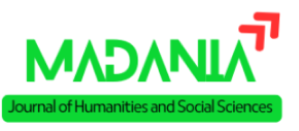Moderasi Mazhab Sebagai Metode Normatif Dalam Fiqh Ekonomi Islam Kontemporer
DOI:
https://doi.org/10.59240/kjsk.v5i2.317Keywords:
Maqaṣid Al-Shari‘ah, Islamic Economic Jurisprudence, Tarjiḥ Wasati, Talfiq, , Tenggerese PluralismAbstract
The exclusivism of Islamic legal schools often limits the adaptability of Islamic jurisprudence in addressing the complex realities of the contemporary Islamic economy. This study departs from the academic concern that rigid adherence to a single madhhab potentially causes legal stagnation in responding to global financial challenges. The research aims to formulate a conceptual and methodological framework for madhhab moderation as an epistemic foundation for contemporary Islamic economic jurisprudence. Using a qualitative method with critical-comparative analysis of classical and contemporary fiqh literature, this study synthesizes diverse madhhab approaches through maqāṣid al-sharī‘ah, maṣlaḥah, and ḥikmah principles. The findings reveal that madhhab moderation enables integrative, context-sensitive legal reasoning that harmonizes textual sources, socio-economic contexts, and higher legal objectives. This study proposes madhhab moderation as a model of tarjīḥ wasatī as a new methodology for formulating inclusive, responsive, and sustainable Islamic economic fatwas. The implications extend to the renewal of tarjīḥ and talfīq methods, strengthening trans-madhhab collaboration, and enhancing the global relevance of Islamic economic jurisprudence
References
Abdullah, Fahad, and Ali Hajer. “Jurisprudential Rules a Path to Understanding Moderation and Moderation A Rule of ‘“there Should Be Neither Harming nor Reciprocating Harm”’ as an Example.” Migration Letters 20, no. 6 (2023): 1226–35.
Abdullah, Suhaila. “The Quranic Principle of Wasatiyyah as the Foundation of Malaysia Madani ’ s Civilizational Framework.” IJWCPS: International Journal of World Civilizations and Philosophical Studies 2 (2025): 86–104.
Al-Askar, Majid bin Abdullah bin Muhammad. “Maqashid Asy-Syari’ah Fi Al-Mu’amalat Al-Maliyyah ’inda Ibn Taimiyyah Wa Atsaruha Fi Al-Ahkam Al-Fiqhiyyah Wa Al-Nawazil Al-Maliyyah Al-Mu’ashirah.” Universitas Ummul Qura, n.d.
Al-Qardhawi, Yusuf. Al-Halal Wa Al-Haram Fi Al-Islam. Mesir: Darul Ma’rifah, 1985.
Alam, Nafis, and Syed N Ali. Fintech, Digital Currency and the Future of Islamic Finance. Fintech, Digital Currency and the Future of Islamic Finance, 2021. https://doi.org/10.1007/978-3-030-49248-9.
Alamudi, Ichwan Ahnaz. “Intellectual Development Of Maqashid Al-Syariah : A Thought Of Jaseer Auda.” Tawazun: Journal of Sharia Economic Law 7, no. 2 (2024): 162–76.
Aljamos, Yusof Mahmoud, Azman Mohd Noor, Mohamad Shafiq Mohd Aswadi, and Ahmad Syukran Baharuddin. “The Blockchain Technology from Maqasid Shari’ah Perspective.” Journal of Contemporary Maqasid Studies 1, no. 2 (2022): 59–82. https://doi.org/10.52100/jcms.v1i2.54.
Amin, Ibnu, Salma Salma, Muchlis Bahar, and Lendrawati Lendrawati. “Stratification of Al-Maqashid Al-Khamsah (Preserving Religion, Soul, Reason, Heredity and Property) and Its Application in Al-Dharuriyah, Al-Hajiyah, Al-Tahsiniyah, and Mukammilat.” AJIS: Academic Journal of Islamic Studies 9, no. 1 (2024): 264. https://doi.org/10.29240/ajis.v9i1.8941.
An-Nadwi, ’Ali Ahmad. Mausu’ah Al-Qawā’id Wa Ḍawābit Al-Fiqhiyyah Al-Ḥākimah Li Al-Mu’āmalāt Al-Māliyyah Fi Al-Fiqh Al-Islamī, 1999.
Ar-Raisuni, Ahmad. Muhadharat Fi Maqashid Al-Syari’ah. Kairo: Dar Al-Kalimah, 2010.
Arum, Hafidza Sanshia, Nanda Ega Rupita, Hafidza Sanshia Arum, Nanda Ega Rupita, and Muhammad Albahi. “Maqasid Sharia As A Philosophical Foundation In Islamic Economic Policy Making.” Malia: Jurnal Ekonomi Islam 16, no. 1 (2024): 28–43. https://doi.org/10.35891/ml.v16i1.5798.
Auda, Jasser. Maqasid Al-Shariah as Philosophy of Islamic Law A Systems Approach. Herndon, USA: The International Institute of Islamic Thought, 2007.
Az-Zuhaili, Wahbah. Al-Mu’amalat Al-Maliyyah Al-Mu’ashirah. Damaskus: Dar Al-Fikr, 2002.
Azzuhri, Anggi, and Haidar Masyhur Fadhil. “Reimagining Economic Wellbeing and Justice : The Wasaṭiyya Framework in Islamic Economics.” Economica: Jurnal Ekomomi Islam 13, no. 2 (2022): 225–41. https://doi.org/10.21580/economica.2022.13.2.14139.
Bakar, Alyasa Abu, and S Sahman. “The Renewing of Usul Al-Fiqh: Challenges, Limitations and Future Directions.” Indonesian Journal of Islamic Economic Law 1, no. 2 (2024): 105–22. https://doi.org/10.23917/ijoel.v1i2.5334.
Beddu, Sumiyati, Suud Sarim Karimullah, Asbullah Muslim, and Nanda Ahmad Basuki. “From Doctrine to Action: Islamic Law’s Journey towards Social Change.” Jurnal Wawasan Yuridika 8, no. 1 (2024): 1–24. https://doi.org/10.25072/jwy.v8i1.4177.Abstract.
Daud, Zakiul Fuady Muhammad. “Fiqh Across Madhhabs: An Alternative to Pesantren Students’ School of Thought Exclusivism in the Post-Truth Era.” Mazahib: Jurnal Pemikiran Hukum Islam 20, no. 1 (2021): 143–68. https://doi.org/10.21093/mj.v20i1.3081.
Fad, Mohammad Farid, and Ali Imron. “Halal Cryptocurrency Model Under the Maqashid Al-Shari’ah Scheme.” Journal of Islamic Economics Lariba 8, no. 1 (2022): 229–41. https://doi.org/10.20885/jielariba.vol8.iss1.art14.
Fayyad, Mahmoud. “Reconstructing Lease-to-Own Contracts: A Contemporary Approach to Islamic Banking Standards.” Heliyon 9, no. 9 (September 2023): e19319. https://doi.org/10.1016/j.heliyon.2023.e19319.
Gad Makhlouf, Ahmed. “Continuity and Change of Traditional Islamic Law in Modern Times: Tarjīḥ as a Method of Adaptation and Development of Legal Doctrines.” Oxford Journal of Law and Religion 12, no. 1 (March 25, 2024): 55–74. https://doi.org/10.1093/ojlr/rwad010.
Ghozali, Mohamad, Dedah Jubaedah, and Deni Kamaludin Yusup. “Comparative Analysis of Economic Fiqh in Islamic Financial Transactions : A Review of Literature from Various Madhhabs.” Al-Mustashfa: Jurnal Penelitian Hukum Ekonomi Syariah 9, no. 2 (2024): 305–20.
Hammad, Nazih. Fiqh of Contemporary Finainancial and Bankining Transactions. Bahrain: Al-B raka Banking Group (ABG), 2013.
Harahap, Alfi Andriansyah, and Imsar Imsar. “Economic Transactions In Islamic Financial Institutions: Analysis of Fiqh Rules, Opportunities, and Challenges in The Era Of Globalization.” Al-Fikru: Jurnal Ilmiah 17, no. 2 (2023): 259–72. https://doi.org/10.51672/alfikru.v17i2.270.
Haris, Yogi Sopian, Betty Mauli, and Rosa Bustam. “Reconciliation Amongst Islamic-Based Groups as a Solution to the Tolerance Issue and the Accomplishment of Religious Moderation in Indonesia.” Jurnal SMaRT 10, no. 2 (2024): 141–54. https://doi.org/10.18784/smart.v10i2.2464.
Hasanudin, and Ainul Yaqin. “The Transformation of Ijârah: From Fiqh to Sharia Banking Products Hasanudin.” Al-Ihkam: Jurnal Hukum Dan Pranata Sosial 14, no. 1 (2019): 72–98. https://doi.org/10.19105/al-ihkam.v14i1.1893.
Hassan, Murie. “Yusuf Al-Qaradawi’s Jurisprudence of Priorities: A Critical Assessment.” American Journal of Islam and Society 40, no. 1–2 (2023): 77–120. https://doi.org/10.35632/ajis.v40i1-2.3190.
Hefni, Wildani, Imam Mustofa, and Rizqa Ahmadi. “Looking for Moderate Fiqh: The Thought of Mohammad Hashim Kamali on the Reformation of Rigidity and Inflexibility in Islamic Law.” Al-Istinbath: Jurnal Hukum Islam 10, no. 1 (April 25, 2025): 30–57. https://doi.org/10.29240/jhi.v10i1.10694.
Husni, Ahmad Bin Muhammad, Saheed Abdullahi Busari, and Amin Bin Muhammad Husni. “Manifestation of Moderation in the Context of Islamic Law: Maqasid Study.” Al Hikmah International Journal of Islamic Studies and Human Sciences 5, no. 2 (2022): 25–44. https://doi.org/10.46722/hkmh.5.2.22b.
Ishandawi, Yadi Janwari, and Dedah Jubaedah. “Mazhab Dan Pemikiran Ekonomi Islam Kontemporer.” Al-Kharaj: Jurnal Ekonomi, Keuangan & Bisnis Syariah 6, no. 8 (2024): 5932–45. https://doi.org/10.47467/alkharaj.v6i8.3963.
Islam, Hukum, Islamic Law, and Contemporary Challenges. “Hukum Islam Jurnal Islamic Law and Contemporary Challenges from Fresh Ijtihad Point of View.” Jurnal Hukum Islam 20, no. 1 (2022): 101–24.
Jamaludin, Mohd Hafiz, Ahmad Hidayat Buang, and Arip Purkon. “Talfīq as A Method for Legal Solutions in Contemporary Islamic Law.” Ahkam: Jurnal Ilmu Syariah 24, no. 1 (2024): 55–66. https://doi.org/10.15408/ajis.v24i1.33608.
———. “Talfīq as A Method for Legal Solutions in Contemporary Islamic Law.” AHKAM : Jurnal Ilmu Syariah 24, no. 1 (June 30, 2024): 55–66. https://doi.org/10.15408/ajis.v24i1.33608.
Jamaludin, Mohd Hafiz, Norhidayah Pauzi, Syed Mohd Jeffri Syed Jaafar, and Mahyudin Daud. “Pemikiran Ulama Muta’akhkhirin Berhubung Pengamalan Konsep Talfiq Dalam Penyelesaian Hukum Syarak (The Muta’akhkhirin Scholars’ Perspective on the Implementation of the Talfiq Concept in Resolving Islamic Legal Issues).” Afkar: Jurnal Akidah & Pemikiran Islam 25, no. 2 (December 28, 2023): 323–52. https://doi.org/10.22452/afkar.vol25no2.10.
Johari, Maghfirah, Ahmad Maulidizen, and Habiburrahman Rizapoor. “Istiḥsān Method and Its Relevance to Islamic Law Reform: Content Analysis of Fatwa of Majelis Ulama Indonesia on Corneal Transplant.” De Jure: Jurnal Hukum Dan Syar’iah 15, no. 1 (2023): 1–20. https://doi.org/10.18860/j-fsh.v15i1.18442.
Khalidin, Bismi, and Armiadi Musa. “Murabaha Financing of The Indonesian Islamic Banks Under an Islamic Economic Law and The Fatwa Dsn Mui.” PETITA: Jurnal Kajian Ilmu Hukum Dan Syariah 8, no. 2 (October 15, 2023): 203–18. https://doi.org/10.22373/petita.v8i2.238.
Khuluq, M Khusnul, and Asmuni. “Hifz Al-Bi’ah as Part of Maqashid Al-Shari’ah and Its Relevance in the Context of Global Climate Change.” IJIIS: Indonesian Journal of Interdisciplinary Islamic Studies 7, no. 2 (2024): 161–78. https://doi.org/10.20885/ijiis.vol7.iss2.art3.
Mafaid, Ahmad, Zulfikar. “Principles of Islamic Moderation in Indonesia from Ushul Fiqh Perspective.” Proceedings The 1st Annual Dharmawangsa Islamic Studies International Conference, 2022, 45–56. https://proceeding.dharmawangsa.ac.id/index.php/PROSUNDHAR/article/view/82.
Makhlouf, Ahmed Gad. “Continuity and Change of Traditional Islamic Law in Modern Times: Tarjı ¯h: As a Method of Adaptation and Development of Legal Doctrines.” Oxford Journal of Law and Religion 12, no. 1 (2023): 55–74. https://doi.org/10.1093/ojlr/rwad010.
Maliha, Novi Fitia, Fuady Abdullah, Ima Frafika Sari, Institut Agama, and Islam Negeri. “The Authority of the Fatwa of the Majelis Tarjih and Tajdid on Fajr Time in Ponorogo East Java : Between Scholarly Authority and Organizational Compliance.” Asy-Syir’ah: Jurnal Ilmu Syari’ah Dan Hukum 58, no. 1 (2024).
Mardika, Andi. “The Application of Moderation Values in Islamic Criminal Law.” Moderation : Journal of Religious Harmony 1, no. 2 (2024): 96–105. https://doi.org/10.47766/moderation.v1i2.4819.
Mohammad, Nabil. “The Role of the Qur’ānic Principle of Wasaṭiyyah in Guiding Islamic Movements.” Australian Journal of Islamic Studies 3, no. 2 (2018): 21–38. https://ajis.com.au/index.php/ajis/article/view/103.
Mohammed, Tawffeek A.S. “A Scientometric Study of Maqasid Al-Shariah Research: Trending Issues, Hotspot Research, and Co-Citation Analysis.” Frontiers in Research Metrics and Analytics 9 (2024). https://doi.org/10.3389/frma.2024.1439407.
Monawer, Abu Talib Mohammad, Noor Naemah Abdul Rahman, Ameen Ahmed Abdullah Qasem Al-Nahari, Abdul Karim Ali Luqman Haji Abdullah, and Achour Meguellati. “The Actualization of Maqāṣid Al-Sharīʿah in Islamic Finance: A Conceptual Framework.” International Journal of Islamic and Middle Eastern Finance and Management 15, no. 5 (2022): 847–64. https://doi.org/10.1108/IMEFM-06-2020-0293.
Muhammad Mumtaz Ali, and Muneer Muhammed Rafeeque. “Wasaṭiyyah (Moderation) as the Principle and Objective of the Shariah as a Solution for Preventing Violence and Extremism.” Journal of Islam in Asia 15, no. 2 (2018): 477–99.
Muhardi, Sona, and Zulfikar Hasan. “Comparative Analysis Of Financing Schemes Through Ijarah Muntahiya Bittamlik With Murabahah In Indonesian Islamic Banking.” MAFAHIM: Journal of Islamic Studies and Global Discourse 1, no. 1 (2025): 306–14.
Muslimin, J. M., Lutfi Chakim, and Fauzani. “Maqasid Al-Shariah in Environmental Conservation of Yusuf Al-Qardawi’s Perspective.” In ICRI: International Conference on Recent Innovations, 869–77, 2018. https://doi.org/10.5220/0009919008690877.
Nafiu, Ahmed. “Application of Istiṣḥāb and Istiḥsān in Islamic Law of Inheritance : An Analytical Study.” International Journal of Fiqh and Usul Al-Fiqh Studies 8, no. 2 (2024): 142–56.
Nasution, Lailan Azmi, Yulia Sari, Novita Sari Pasaribu, and Rahmayati. “Implementation of Maqashid Sharia Principles in Modern Islamic Financial Management.” In Proceeding International Seminar on Islamic Studies, 6:3120–25, 2025.
Oluwaseun, Saidu Sulaiman. “An Examination of The Major Madhhabs: A Case for Reunification.” Journal of Shariah Law Research 7, no. 2 (2022): 161–84. https://malindojournal.um.edu.my/index.php/JSLR/article/view/40856/15246.
Putro, Dimas Handoyo, Nurwahidin, Mulawarman Hannase, Muhammad Cholil Nafis, Nur Fatwa, and Mohammad Izdiyan Muttaqin. “Contextualization of Ushul Fiqh in Muamalah and Modern Banking : Sharia Solutions in the Global Economic System.” IJIS: Internasional Journal of Integrative Sciences 3, no. 11 (2024): 1243–54. https://doi.org/10.55927/ijis.v3i11.12424.
Qal’ah Ji, Muhammad Rawas. Al-Mu’amalat Al-Maliyah Al-Mu’ashirah Fi Dhau’ AlFiqh Wa Al-Syari’ah. Beirut, Lebanon: Dar al-Nafa’is, 1999.
Riyanto, Waryani Fajar. “Integrative-Intersubjective Type of Islamic Law Studies : The Shifting of Paradigms in Epistemology of Islamic Law at the Faculty of Sharī ’ a and Law , Sunan Kalijaga State Islamic University , Indonesia ( Perguruan Tinggi Keagamaan Islam Negeri – PTKIN.” Asy-Syir’ah: Jurnal Ilmu Syari’ah Dan Hukum 58, no. 1 (2024): 1–46.
Saleh, Abdul Mun’im, and M Ilham Tanzilulloh. “The Conceptualization of Religious Moderation in Islamic Economic Jurisprudence: A Study of Al-Risalah by Imam Al-Shafi’i.” Journal of Sharia and Economic Law 2, no. 2 (2022): 234–47. https://doi.org/10.21154/invest.v2i2.
Soofi, Ahmer Bilal. “International Law and Maqasid Al-Shariah.” SSRN Electronic Journal, 2024, 1–4. https://doi.org/10.2139/ssrn.4937103.
Sutrisno, A. “The Concept of Maqasid Sharia According to Jasser Auda.” El-Faqih: Jurnal Pemikiran Dan Hukum Islam 8 (2022). https://ejournal.iaifa.ac.id/index.php/faqih/article/view/707%0Ahttps://ejournal.iaifa.ac.id/index.php/faqih/article/download/707/602.
Suud Sarim Karimullah, and Arif Sugitanata. “The Hanafi School of Islamic Jurisprudence Literature: A Historical Account.” Journal of Islamic History and Manuscript 2, no. 1 (2023): 1–20. https://doi.org/10.24090/jihm.v2i1.7788.
Syamsuar, Ahmad Omar Chapakia, Amrizal Hamsa, and Amelia. “Integration of Maqashid Syaria in Nurcholish Madjid’s Thingking about Principles for Effective Good Governance.” Al-Istinbath: Jurnal Hukum Islam 9, no. 1 (2024): 45–62. https://doi.org/10.29240/jhi.v9i1.9701.
Syarif, Muhammad Fazlurrahman, and Ahmet Faruk Aysan. “Usury-Free Capital through Sharia Fintech : Insights from Hanafi, Maliki, Al-Shafi’i, and Hanbali Madhhabs.” MAZAHIBUNA: Jurnal Perbandingan Mazhab 6, no. 2 (2024): 215–32. https://doi.org/10.24252/mazahibuna.vi.51543.
Za’tari, “Ala” al-Din. Fiqh Al-Mu’amalat Al-Maliyah Al-Muqaran: Shiyaghah Jadidah Wa Amtsilah Mu’ashirah. Damaskus: Dar al-Ashma’, 2008.
Downloads
Published
How to Cite
Issue
Section
License
Copyright (c) 2025 Anis Ardiyah, Muhajir, Achmad Nursobah

This work is licensed under a Creative Commons Attribution-NonCommercial-ShareAlike 4.0 International License.






